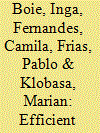|
|
|
Sort Order |
|
|
|
Items / Page
|
|
|
|
|
|
|
| Srl | Item |
| 1 |
ID:
137658


|
|
|
|
|
| Summary/Abstract |
As countries move toward larger shares of renewable electricity, the slow diffusion of active electricity load management should concern energy policy makers and users alike. Active load management can increase capacity factors and thereby reduce the need for new capacity, improve reliability, and lower electricity prices. This paper conceptually and empirically explores barriers to load shift in industry from an end-user perspective. An online survey, based on a taxonomy of barriers developed in the realm of energy efficiency, was carried out among manufacturing sites in mostly Southern Germany. Findings suggest that the most important barriers are risk of disruption of operations, impact on product quality, and uncertainty about cost savings. Of little concern are access to capital, lack of employee skills, and data security. Statistical tests suggest that companies for which electricity has higher strategic value rate financial and regulatory risk higher than smaller ones. Companies with a continuous production process report lower barrier scores than companies using batch or just-in-time production. A principal component analysis clusters the barriers and multivariate analysis with the factor scores confirms the prominence of technical risk as a barrier to load shift. The results provide guidance for policy making and future empirical studies.
|
|
|
|
|
|
|
|
|
|
|
|
|
|
|
|
| 2 |
ID:
125620


|
|
|
|
|
| Publication |
2013.
|
| Summary/Abstract |
This paper analyzes the effects of providing feedback on electricity consumption in a field trial involving more than 1500 households in Linz, Austria. About half of these households received feedback together with information about electricity-saving measures (pilot group), while the remaining households served as a control group. Participation in the pilot group was random, but households were able to choose between two types of feedback: access to a web portal or written feedback by post. Results from cross section OLS regression suggest that feedback provided to the pilot group corresponds with electricity savings of around 4.5% for the average household. Our results from quantile regressions imply that for households in the 30th to the 70th percentile of electricity consumption, feedback on electricity consumption is statistically significant and effects are highest in absolute terms and as a share of electricity consumption. For percentiles below or above this range, feedback appears to have no effect. Finally, controlling for a potential endogeneity bias induced by non random participation in the feedback type groups, we find no difference in the effects of feedback provided via the web portal and by post.
|
|
|
|
|
|
|
|
|
|
|
|
|
|
|
|
| 3 |
ID:
128348


|
|
|
|
|
| Publication |
2014.
|
| Summary/Abstract |
As a result of the current international climate change strategy, the European Commission has agreed on ambitious targets to reduce CO2 emissions by more than 80% until 2050 as compared to 1990 levels and to increase the share of renewable energy and improve energy efficiency by 20% until 2020. Under this framework, renewable energy generation has increased considerably in the EU and it is expected to keep growing in the future years. This paper presents long-term strategies for transmission infrastructure development to integrate increasing amounts of renewable generation in the time horizon of 2030-2050. These are part of the outcomes of the SUSPLAN project,1 which focuses on four possible future renewable deployment scenarios in different European regions taking into account the corresponding infrastructure needs, especially electricity and gas grids, both on regional and transnational level. The main objective of the project is the development of guidelines for the integration of renewable energy into future energy infrastructures while taking account of national and regional characteristics. Therefore, the analysis is based on a two-track approach: A transnational modeling exercise ("top-down") and in-depth case studies for nine representative European regions ("bottom-up").
|
|
|
|
|
|
|
|
|
|
|
|
|
|
|
|
|
|
|
|
|